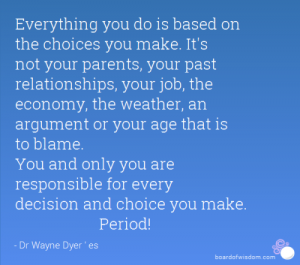
Period!
While browsing Facebook memes the other day I came across this quote (in blue), attributed to Dr. Wayne Dyer.
When I read it, I felt real anger rising in me for what I considered to be the compassionless message of the quote. As a Marriage and Family Therapist Intern, I’ve worked with clients who suffered unthinkable abuse as children, clients who weren’t provided with any of the loving attention, modeling, resources and guidance necessary to ease them from infancy to healthy maturation. I’ve heard stories of abusive childhoods that left me gasping and horrified — reactions I kept inside while I quietly held space for my clients to walk me through their experiences.
The reality is, children who are exposed to such environments — survivors of complex trauma including severe neglect and abuse (physical and sexual), learn avoidance strategies early in life. Survivors of crappy abusive childhoods can’t tolerate distress and so they develop ways to stop feeling. We all use avoidance strategies to some extent but these wounded individuals feel that they have no choice: it’s either numb out or die. What’s a highly effective (though maladaptive) avoidance strategy? Substance abuse. Dr. John Briere, in his training on Treating Complex Psychological Trauma, states that the majority of IV drug users, especially women, have a Childhood Sexual Abuse history. Dr. Briere confirms that trauma survivors frequently engage in behaviors that some might call “bad choices” as a way to down-regulate overwhelming internal states. These can include excessive sexual contact (“promiscuity”), thrill-seeking and binge shopping (“irresponsible spending”).
In other words, the humans among us that we may think of us making the most irresponsible “choices” may be those who are suffering the greatest — with pasts that we can’t even begin to imagine. If a boy who was starved and beaten by his parents as a child is drinking vodka at age 13, smoking meth by age 14, in Juvenile Hall by 16, and ends up with the inability to hold a job, or a relationship, is his childhood not “to blame”? If we don’t like the word “blame,” can we at least acknowledge that the boy’s choices were guided by the horrifically bad hand he got dealt when he started life? If a girl who was raped by a stepfather from age 3 through age 12, ran away from home to escape it, sold her body to get enough money to feed herself, and became addicted to meth as the only way to numb herself enough to tolerate herself (so strong was her self-loathing by then) ends up as the homeless person you drive by every morning, that’s her choice, right? Hers and only hers? Dr. Dyer’s quote assumes that we all had the same choices, which simply isn’t true. (I haven’t even touched upon how racism, ageism, sexism, homophobia, socio-economic status, and other discriminatory factors negatively affect choices. The stigma attached to non-trauma related mental disorders, and physical and/or developmental disorders can also limit life choices.)
Many of these men and women that our culture judges so harshly are longing to learn how to make good choices for themselves because they never had the structure and the modeling to do so. They are fighting for their lives with a courage I can’t imagine. Focused on getting help, getting sober, getting jobs, getting better. And survivors don’t usually blame others for their circumstances, anyway. Quite the opposite, they usually blame themselves and I work with them to help them have compassion for their lives and circumstances.
Maybe at this point you’re thinking, yes, but adults who were abused as children are rare. Actually, a child abuse report is made in this country every 10 seconds. Referrals to state child protective services agencies involve 6.3 million children. While not all of those are substantiated, too many are. And 80% of 21-year-olds who reported being abused as a child meet the criteria for at least one psychological disorder. [Source: childhelp.org] Children who experience child abuse and neglect are 59% more likely to be arrested as a juvenile, 28% more likely to be arrested as an adult, and 30% more likely to commit violent crime. [safehorizon.org]
If I were to re-write Dr. Dyer’s quote with some heart and accuracy, it would go something like this: “Everything you do is based on how you learned to navigate the world as a child (combined with biological factors including genetics and temperament). If you had a secure attachment with your caretaker as an infant, you likely explored your environment confidently, developed a positive self-image, and had confidence that you could cope with whatever happened. Then, as a securely attached infant, you likely became an effective problem-solver as a toddler and a resilient, resourceful, curious preschooler. Your positive experience with your caregiver was a model that served as a guide for your interpersonal behavior and self-expectations. If you did not have that secure attachment, your parents are probably not to blame because they likely came into the world with their own challenges. If you had a severely rough start in life and/or are struggling with a mental disorder, addiction or any other dysfunctional reality, it’s not useful to blame your parents, your past relationships, your job, the economy, the weather, an argument or your age. You and only you can recognize when you need help (although a kind friend, mentor, teacher, or clergyman can certainly play a role in getting you the help you need), and you and only you can then take the steps necessary to get strong and well and empowered.”
Period!





